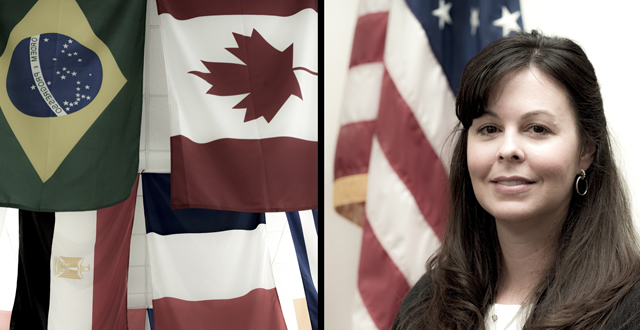In August, Woodrow Wilson High School embarked on its fourth year of being the only public school in Dallas ISD to offer the International Baccalaureate program as one of four college prep academies. And right next door, J. L. Long Middle School is nearing the end of its journey to become designated an official IB Middle Years school.
Woodrow has a new IB coordinator this year, and with three years of experience, the Woodrow staff is feeling good about its fourth year as an IB school, when graduating seniors will have gone all the way through the program.
“It’s going pretty smoothly,” says IB coordinator Kelly Ritchie. “We’ve been addressing some gaps, particularly gaps of communication. I feel like we’ve made really good progress there.”
But it hasn’t always been such smooth sailing for the program. As with anything new, it has taken a while to iron out some of the kinks.
“There have been some growing pains with people getting the hang of what this really is,” says Woodrow’s SBDM chairperson, Susan Schuerger. “We’ve been gearing up, but I think having Kelly here helps, and I think we’re ready for it.”
Before coming to Woodrow, Ritchie worked at Imagine International Academy of North Texas, a charter school in McKinney that teaches IB from kindergarten to graduation.
“IB is highly effective,” she says. “It’s good that Dallas has made this investment in order for Woodrow to offer this, especially as a public school.”
International Bacca-what-a?
The educational system is riddled with acronyms — PTA, SBDM, ADHD, APR, EC. So, if you’ve never bothered to ask, “What is IB?” don’t feel bad; you’re in good company.
“Most people don’t know what it is, or they have a very basic idea,” Ritchie says.
“IB is a program that offers students a curriculum and a framework that allows them to take in information and process it themselves, so we’re teaching a way of thinking. We’re teaching to think versus just filling students up with rogue knowledge. That’s really the core of the program.
“The other piece, of course, is the international-mindedness,” she says, “bringing in awareness about our place in the world, the fact that there is a larger world out there and how to connect to that —what is our role in it? It’s really teaching kids to be proud of who they are and where they come from, but also to extend themselves to learn about other nations, environments and cultures.”
IB does all this through six different learning avenues: language acquisition, studies in language and literature in the first language, individuals and societies (history and geography with a global perspective), mathematics, performing arts and science.
“And it’s set in a background of interconnectedness,” Ritchie says. “Ideally what you’re learning in these subjects will bleed over into the other subjects. It’s intended to be a very holistic approach.”
Woodrow IB students also take Theory of Knowledge, which Ritchie calls the “reward class” because it’s the fun class students can take in the midst of all the work and requirements the IB program entails.
“It’s the class where you really get to sit and converse about big topics,” Ritchie says, “like how do you know what you know? How do you know the facts you’re receiving are truthful and honest? How do we look at statistics and what are the ethics involved in different situations?”
By end of senior year, each student must write a 4,000-word essay, similar to a college thesis on a high school level. Students also have to take a test at the end of the year, which determines whether they receive an IB diploma.
And finally, students also have extracurricular activity requirements. They have to spend time outside of school “doing things they’re passionate about,” Ritchie says.
If the pathway fits …
At Woodrow this year there are more than 35 seniors in the IB program, about 80 10th-graders and about 100 ninth-graders.
One of the biggest hurdles Ritchie has had to overcome in her short time as Woodrow’s IB coordinator is communicating to parents and students that, while there are many positive aspects of the program, the requirements and expectations can be sobering for even the brightest student.
The workload is both larger and harder than that of a traditional classroom setting because teachers challenge students on an analytical level, Ritchie says.
“It’s hard. You’re losing sleep and not getting to spend as much time with friends or doing the other things high schoolers enjoy,” Ritchie says. “But that’s what makes it such great college prep, and for the most part, parents have been very on board with the extra work,” she explains.
However, IB isn’t just for the smart kids.
“It can be for anybody, but it’s not for everybody,” Ritchie says. “There are students that lend themselves to this type of learning. There are very successful students who you might not identify as the most academic in their class, but they find a way to really connect with this, and it opens something they haven’t really gotten anywhere else. It really ignites a passion for learning, and that’s the point of the program, is to really tap into that.”
In the end, students have to want an education that’s interdisciplinary and interconnected. They also must be able to handle the rigor that comes along with it, she says.
“So for students who are not up for that, that’s OK; there are other pathways, but this provides an outlet for kids who want that kind of education.”
The IB Middle Years program
This year, J. L. Long Middle School is on the threshold of becoming an IB Middle Years Program, which helps to ease students into the IB philosophy.
Applying to becoming an IB school is a three-year process, says Long principal Danielle Petters.
First, schools must apply to be a candidate, and once accepted, the school must implement the program as part of its curriculum. Teachers have to be trained, and the school has to pay a fee to the International Baccalaureate Organization. At that point the school is assigned a consultant who tours the school and makes recommendations.
Then there’s the authorization visit, which Long received on Oct. 14 and 15. During the visit, representatives from the national IB organization hosted intense interviews with groups of Long leaders, teachers, students and parents.
“It’s been an extremely rigorous transition,” says Long’s IB coordinator Dora Renaud, “but everybody’s on board.”
In November, Long met 32 out of the 33 requirements.
“The one matter that our school needs to address before the final recommendation and authorization is for our action plan to reduce the number of students not receiving 50 hours of instruction in all eight subjects,” Renaud says, “including an avenue for students to engage in both visual arts and performing arts.”
Renaud says the Long staff immediately began planning how to meet the remaining requirement to submit an action plan to IB nationals before Christmas break. Once everything is approved, Long will be named an official IB Middle Years school, and staff members hope to host a ceremony in the spring.
There are some distinct differences between the IB Middle Years program and the high school level or “diploma program” at Woodrow.
The Middle Years program is a more philosophical approach, a framework for the school, Petters says. Also, while students must opt in at the high school level, middle school students automatically become part of the IB program.
Long now hires teachers who fit the IB criteria, and the school has eight subject areas instead of seven, following the IB guidelines. Because of that, Long offers some courses that traditional middle schools might not, such as Chinese.
The core of IB stays the same at all grade levels.
“It’s about perspective,” Petters says. “So, how do you connect theater to life? To math? To science? To reading/language arts? Where are those connections? It’s connections within those subject areas, and it’s also connections across cultures. It’s cross-discipline and cross-cultures.”
The hope is that the Middle Years program prepares students for the diploma program down the road, Petters says.
Petters’ daughter, a freshman at Woodrow this year, chose the IB academy, and all summer she was mentally preparing herself for the workload, Petters says.
“So if nothing else, I didn’t think of high school that way,” she says. “We also talk a lot about college, and a part of going to college is going to Woodrow. So they’re thinking about it.”






